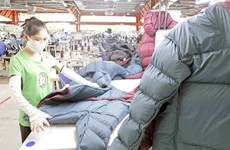Vietnam best in region, say Japanese firms
Vietnam is the most attractive
investment destination among ASEAN member nations for Japanese
businesses, according to a survey conducted by the Japan External Trade
Organisation.
The survey found 58 percent of Japanese enterprises want to expand their business in Vietnam, which is a positive sign for both countries in the context of global economic turmoil.
The survey found 58 percent of Japanese enterprises want to expand their business in Vietnam, which is a positive sign for both countries in the context of global economic turmoil.
Vietnam is the most attractive
investment destination among ASEAN member nations for Japanese
businesses, according to a survey conducted by the Japan External Trade
Organisation.
The survey found 58 percent of Japanese enterprises want to expand their business in Vietnam, which is a positive sign for both countries in the context of global economic turmoil.
The results of the survey were released at a workshop on the Vietnamese economy held by JETRO in Tokyo late last month.
Koichi Hori, chairman of the board of directors of Dream Incubator Vietnam Joint Stock Company, said at the workshop that Vietnam was an even more attractive investment destination than China.
Japanese businesses operating in six ASEAN countries – Indonesia, Malaysia, the Philippines, Singapore, Thailand and Vietnam – were polled, besides India.
Vietnam topped the list with 38.8 percent of companies naming it the best investment destination, followed by the Philippines with 26.1 percent, Thailand with 21.6 percent and Singapore with 20.2 percent.
Vietnam had the highest percentage of firms that were expanding production and transferring technology from other countries.
Many Japanese businesses preferred Vietnam to other ASEAN member countries due to its social and political stability (64.5 percent), its market potential (47.8 percent) and low labour costs (37.7 percent), the survey found.
Hori highlighted the major successes achieved by many Japanese businesses in Vietnam, including Ajinomoto and others.
The survey also pointed out some of barriers faced by Japanese companies in Vietnam, including complicated administrative procedures (67.2 percent), incomplete infrastructure (66.4 percent) and inconsistent implementation of policies (49.6 percent).
Akira Hirano, overseas investment director for Acecook, said poor quality management systems, inconsistent distribution systems, illogical and ineffective ways of working, lack of transparency in doing business among dealers and retailers, and poor marketing skills were also adversely affecting Japanese business operations here.
Other weaknesses in Vietnam’s manufacturing sector and consumer market were pointed out by Hirota Nakanishi, a foreign investment consultant for JETRO in HCM City.
He said the first problem was the lack of a supporting industry in the country, necessitating import of most of the accessories from other countries, increasing production costs and therefore product prices.
The distance between two major economic hubs of Hanoi and HCM City and poor traffic infrastructure were other problems faced by Japanese businesses, Nakanishi said.
Nakanishi suggested that Japanese businesses place their focus on particular customers in particular locations.
He also advised Japanese investors that they learn better the tastes of Vietnamese customers that can change during different seasons of the year.
Japanese companies should take care and choose local businesses with maximum potential to co-operate with in doing business.
For his part, Hirano urged Japanese businesses to expand mobile sales to reach several localities. He said this would be better than trying to reach out to Vietnamese customers through supermarkets.
“Careful and flexible business plans are needed to meet the demand of different population segments on Vietnam”, he added./.
The survey found 58 percent of Japanese enterprises want to expand their business in Vietnam, which is a positive sign for both countries in the context of global economic turmoil.
The results of the survey were released at a workshop on the Vietnamese economy held by JETRO in Tokyo late last month.
Koichi Hori, chairman of the board of directors of Dream Incubator Vietnam Joint Stock Company, said at the workshop that Vietnam was an even more attractive investment destination than China.
Japanese businesses operating in six ASEAN countries – Indonesia, Malaysia, the Philippines, Singapore, Thailand and Vietnam – were polled, besides India.
Vietnam topped the list with 38.8 percent of companies naming it the best investment destination, followed by the Philippines with 26.1 percent, Thailand with 21.6 percent and Singapore with 20.2 percent.
Vietnam had the highest percentage of firms that were expanding production and transferring technology from other countries.
Many Japanese businesses preferred Vietnam to other ASEAN member countries due to its social and political stability (64.5 percent), its market potential (47.8 percent) and low labour costs (37.7 percent), the survey found.
Hori highlighted the major successes achieved by many Japanese businesses in Vietnam, including Ajinomoto and others.
The survey also pointed out some of barriers faced by Japanese companies in Vietnam, including complicated administrative procedures (67.2 percent), incomplete infrastructure (66.4 percent) and inconsistent implementation of policies (49.6 percent).
Akira Hirano, overseas investment director for Acecook, said poor quality management systems, inconsistent distribution systems, illogical and ineffective ways of working, lack of transparency in doing business among dealers and retailers, and poor marketing skills were also adversely affecting Japanese business operations here.
Other weaknesses in Vietnam’s manufacturing sector and consumer market were pointed out by Hirota Nakanishi, a foreign investment consultant for JETRO in HCM City.
He said the first problem was the lack of a supporting industry in the country, necessitating import of most of the accessories from other countries, increasing production costs and therefore product prices.
The distance between two major economic hubs of Hanoi and HCM City and poor traffic infrastructure were other problems faced by Japanese businesses, Nakanishi said.
Nakanishi suggested that Japanese businesses place their focus on particular customers in particular locations.
He also advised Japanese investors that they learn better the tastes of Vietnamese customers that can change during different seasons of the year.
Japanese companies should take care and choose local businesses with maximum potential to co-operate with in doing business.
For his part, Hirano urged Japanese businesses to expand mobile sales to reach several localities. He said this would be better than trying to reach out to Vietnamese customers through supermarkets.
“Careful and flexible business plans are needed to meet the demand of different population segments on Vietnam”, he added./.












